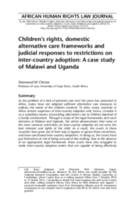Abstract
As the problem of a lack of parental care over the years has worsened in Africa, states have not adopted sufficient alternative care measures to address the needs of the children involved. To date, many countries in Africa remain suspicious of inter-country adoption and, hence, consider it as a subsidiary means of providing alternative care to children deprived of a family environment. Through a study of the legal frameworks and court decisions of Malawi and Uganda, the article demonstrates that some of the most common restrictions on inter-country adoption do not serve the best interests and rights of the child. As a result, the courts in these countries have gone out of their way to bypass or ignore these restrictions, and have sanctioned inter-country adoptions. In doing so, the courts have put themselves at risk of being accused of law making. Due to the absence of an appropriate legal framework, these courts have also struggled to make inter-country adoption orders that are capable of being effectively monitored and supervised by the state authorities in the sending and receiving states. The protection of the rights of children in need of parental care requires that states treat inter-country adoption as a worthy alternative care option that should not be subjected to undue restrictions, but regulated sufficiently to protect and promote the best interests and rights of the child.

